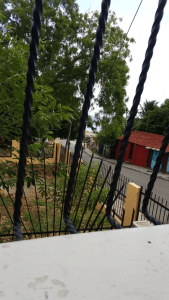Rekhia Adams, Study Abroad ’17, Northwestern ’20
Theatre, International Studies
Studying abroad was something I was excited about and very comfortable with, as I had left my home country (Trinidad) earlier than most to attend an international boarding school in New Mexico. However, when walking through the Study Abroad Fair, I felt very overwhelmed by an overload of information and having too many options made it harder for me to make a decision on which program I should pursue. I was drawn to GESI because I knew that human rights and activism was something I wanted to pursue, but was never really sure what this would look like for me, and GESI presented a model that would allow me to explore this while not being limited. I also knew I wanted a chance to be in a Spanish-speaking country, because my conversational skills have always been my biggest weakness. I was fortunate enough to travel to the Dominican Republic (DR) and this was important for me because as someone coming from the Caribbean myself, I wanted a chance to get a real life experience of another island in my region beyond the tourist attractions.
The first thing I remember upon arriving in the DR was the heat. I had not traveled home to Trinidad that winter break and the DR was my first time back to my usual tropical climate. I remember it being unusually uncomfortable and an indication that Evanston’s unpredictable cold days had gotten the best of me. Next was the Spanish. I had spent seven years practicing every verb conjugation I could think of and feeling like I would be able to handle myself. It was not until Dominican slang and speed of speech surrounded me that I knew my Spanish was not where it needed to be. I spent the first few nights crying because I am a very expressive person and I felt like I was not able to connect with my host family. One day I took a deep breath and decided to stop overthinking it all and see what Spanish would leave my mouth.
I am the youngest of my parents’ three daughters but I also play the role of an older cousin, or Aunty ‘Kia, as I’m affectionately called. In the DR I became a big sister to two amazing children. They were so patient with me and my struggling Spanish but still included me in every activity and I think this helped me get out of my nervous shell. We bonded over card games and language lessons and we would spend so much time outside of our house surrounded by the sound of the nearby sea that my stress slowly slipped away.
With all of the beauty of the DR, came some challenges. This was the first time my race had been a big topic of discussion for me: I went from Trinidad, where much of our population is of mixed race and racial distinctions are not a major concern, to UWC, an international high school where everyone was more concerned with their national pride than race. I knew that being Black in the United States held different connotations, but I believe I spent my freshman year at Northwestern somewhat removed from this issue in some way but still slowly processing its implications. In the DR, colorism was something that I encountered and do not believe I had fully prepared myself for. I remember people thinking I was from the DR, which makes sense as the Caribbean has similar heritage, but the day I spent too much time in the sun I became “fea” or “ugly” or “morena” and I was now being labelled by the shade of my blackness. What struck me the most was that it came from people who I was also classifying as black, but the Afro-Latinx identity is so complex in itself that I did not realize how limited was my point of view on this. This was a struggle but I just remember feeling so proud to be black in this space and using this as my motivation to continue to celebrate my blackness.
I didn’t get to use my Dominican slang in my NU Spanish class the following year and I may not be fluent, but I know basic Spanish survival skills. Along with all of my memories and challenges, I was able to meet new people and also gain a deeper understanding of myself.


